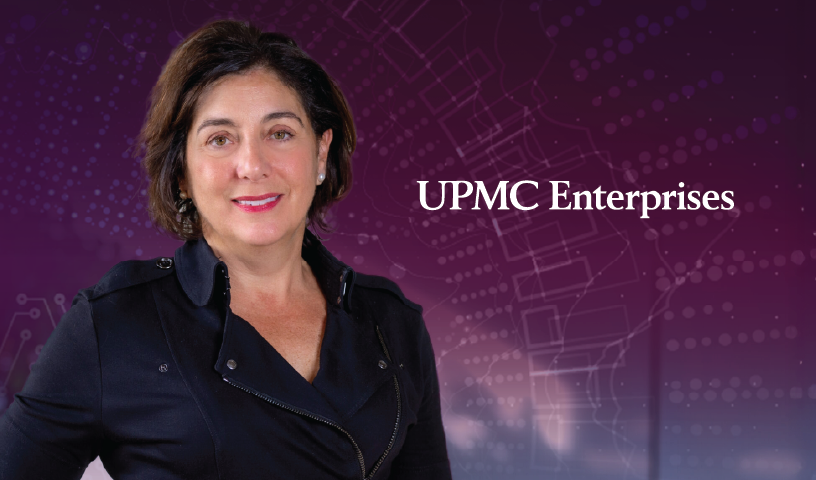
May 28, 2025
Trust and Technology: A Recurrent Theme in Health Care Innovation
Whether the conversation was about patient communication, algorithm deployment, care navigation, or adoption of digital tools, the theme of trust emerged again and again at the 2025 Top of Mind Summit: Digital Health.
Trust is central to making innovation usable, scalable, and sustainable. Without it, even the most promising interventions can fail to take hold with patients, clinicians, and within the systems meant to support the entire health care industry.
Given the present state of affairs, conversations about trust in health care are essential, according to many of the speakers at the Summit, which was hosted by UPMC Enterprises and the Center for Connected Medicine at UPMC.
Health systems need to navigate an environment where misinformation spreads rapidly, and institutional credibility is constantly being challenged. Building and maintaining trust with patients, clinicians, and the broader community is more than a strategic imperative. It is a foundational requirement for delivering effective, equitable, and sustainable care.
Trust as a Prerequisite to Patient Engagement
Earning trust requires more than offering patients access to information or services. Patients must believe in the credibility of the system and feel supported in their interactions.
Tami Minnier, Chief Quality and Operational Excellence Officer at UPMC, described trust as “the liquid gold of health care.” It is built incrementally, not through a single patient interaction but through the reliability of communication, timely follow-up, and evidence that the system is acting in the patient’s interest. That trust, once lost, is difficult to regain and can erode adherence, engagement, and outcomes.
Patients frequently encounter health care at moments of vulnerability, stress, fear, and uncertainty about what may be coming after an encounter, diagnosis, or even just the results of routine lab work checking one’s cholesterol or blood sugar levels. The ability to establish and maintain trust in those moments is often what determines whether patients stay engaged or are lost to follow-up, maybe seeking care elsewhere or not at all.
Information Alone Does Not Build Trust
Kathy Kaluhiokalani, CEO of Pip Care, a UPMC Enterprises portfolio company specializing in perioperative care navigation, emphasized that delivering accurate information is only part of the equation. Pip Care supports patients through surgical preparation and recovery by combining digital education with personalized coaching, which helps to address their informational and emotional needs during a stressful time
“Even the most accurate information will not change behavior if the patient does not believe the source,” Ms. Kaluhiokalani said.
This approach reflects a broader shift in how health systems and digital health companies are approaching patient engagement. Rather than treating communication as a transaction, platforms are beginning to prioritize relationships with patients that go beyond data to deeper context and connection.
Building systems that can adapt to patients’ needs, preferences, and circumstances is central to maintaining trust, particularly during stressful episodes like preoperative preparation or chronic disease management.
Trust Is Equally Essential Behind the Scenes
Trust was not only discussed in the context of patients. Clinicians and health system executives also need to develop trust in the tools and systems deployed in health care.
In sessions focused on AI and data infrastructure, panelists pointed to the risks of deploying tools that lack transparency. Models that perform well in testing may still fail in practice if clinicians do not understand how they function or can’t see how recommendations are derived.
That lack of clarity can lead to overreliance, rejection, or misuse. Any of these negative outcomes compromises the intended value of the tool. Trustworthy AI needs more than validation. It also needs explainability and alignment with clinical workflows.
Without these elements, tools that are technically sound may still be operationally unusable because users do not trust what they are doing or being told.
“We can spend the next 10 years building the world’s best governance framework and miss the opportunity to improve lives. So, it is a balancing act. You need to figure out the trust factor while accelerating progress,” Ms. Kaluhiokalani said.
Ensuring Transparency and Accountability
Trust in technology depends on more than technical capability. Transparency, governance, and ongoing monitoring must be built into the development process from the start, for any kind of health care-related technology, AI or otherwise. Clinicians and administrators need to understand how the tools work, how the decisions are made within the tool, and how performance is being tracked and evaluated.
“The future will belong to those who build for accountability as rigorously as they build for capability,” said Jeffrey Jones, Senior Vice President of Product Development at UPMC Enterprises.
Embedding these safeguards into the lifecycle of digital tools and ensuring they align with operational and clinical priorities is a fundamental requirement for trust.
Long-Term Relationships, Not One-Off Transactions
A consistent message across Summit discussions was that trust is not built through one-time interventions, conversations, or encounters. It is cumulative. Platforms and programs that support continuity over time while tracking progress, personalizing interactions, and closing feedback loops are more likely to be trusted and retained, and ultimately show value.
This principle applies whether supporting surgical recovery, chronic disease management, or behavioral health programs. Solutions that create longitudinal relationships can help reinforce trust by showing patients that the system sees them not just as faceless cases or insurance ID numbers, but as people – as individuals with specific needs that change over time.
In an industry where change is constant (really, the norm), consumer and patient expectations are high, and misinformation is just as readily available as evidence-based facts, trust is a valuable currency, indeed. Trust in health care is not, nor can it be a by-product of pure innovation or creative spirit to solve a problem. It is the foundation that determines whether an innovation can succeed at all.
“We may never reach the ceiling of perfect trust, but we do have a responsibility to put a factual floor in place — one that is evidence-based, consistent, and accessible to all patients regardless of where they’re coming from,” said Gretchen Mendoza, Vice President of Digital Solutions at UPMC Enterprises.
Next Steps
- Read “Seeding Innovation in Uncertain Times,” a summary of the keynote address and fireside chat featuring Dr. Robert Califf, former Commissioner of the U.S. Food and Drug Administration.
- Learn more about Pip Care, a UPMC Enterprises portfolio company delivering perioperative care and health coaching.
- Read all our Top of Mind reports and event coverage.


